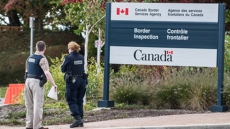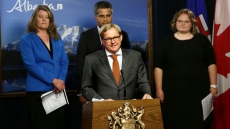A group of mayors from communities on both sides of U.S.-Canada border is calling for the rejection of a precedent-setting request from a Wisconsin city to draw water from the Great Lakes.
The Great Lakes and St. Lawrence Cities Initiative is speaking out ahead of a meeting in the U.S. next week, where a decision is expected on the water diversion application from the city of Waukesha.
The group is urging the governors of eight Great Lake states — who will have the final word on the issue — to reject Waukesha's request because it says the application violates a regional agreement, sets a bad example and has been through a flawed consultation process.
Waukesha, a city of about 70,000 people, wants to divert water from Lake Michigan because its own aquifer is running low and the water is contaminated with high levels of naturally occurring cancer-causing radium.
Under a current regional agreement between eight U.S. states and Ontario and Quebec, diversions of water away from the Great Lakes-St. Lawrence River basin are banned, with limited exceptions that can be made only when certain conditions are met.
Waukesha wants to become the first such exception, arguing that although it's located outside the boundary of the Great Lakes basin, it is part of a county straddling that geographical line. It also promises to return treated water to Lake Michigan.
Canadian and American opponents of Waukesha's plan have warned the city's request, if approved, could set a dangerous precedent for other communities facing water shortages.
But last month, the city's request received preliminary approval from representatives of the Great Lake states, Ontario and Quebec who said Waukesha's application would comply with the regional agreement if certain conditions were met.
Those conditions include service to a smaller area and an average limit of 31 million litres a day.
But the mayors from the Great Lakes and St. Lawrence Cities Initiative say the amended service area is still too large, the return flow of water to Lake Michigan through the Root River has not been analysed closely enough, and the approval process dealing with Waukesha's request has not allowed enough public participation.
"There is clear evidence that Waukesha has reasonable alternatives to provide safe drinking water to its citizens, and I do not want to see their effluent contaminate the Root River in downtown Racine," said John Dicker, mayor of Racine, Wis.
"Local governments across this region and in both the US and Canada are calling on the governors of eight Great Lakes states to reject Waukesha’s application and protect these vital waters we cherish."
Waukesha's application needs a unanimous vote of approval by eight states to get the final green light. Ontario and Quebec do not get a vote but they have submitted their views and recommendations on the issue.
Ontario had previously expressed concerns about Waukesha's request and found that the potential impacts of the proposed diversion on Great Lakes water quantity had not been sufficiently assessed.
Its review of the matter also acknowledged that Waukesha's proposal was likely just the beginning of similar future requests.
The Great Lakes support 33 million people, including nine million Canadians and eight of Canada's 20 largest cities, according to the federal government.



